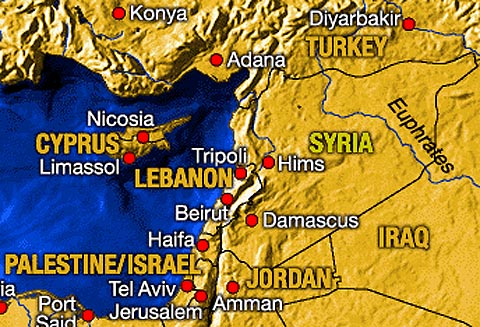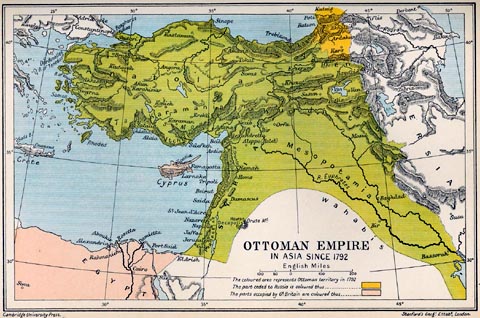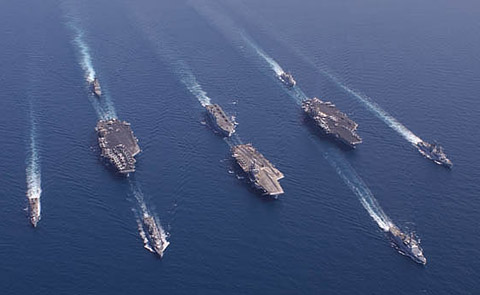SUBJECT: AMERICAN QUAGMIRE IN MIDEASST
SOURCE: KEN TAYLOR taylork021@hawaii.rr.com
POSTED: 22 October 9:30am HST
Bush in trouble - looks for action in Syria

| Bush
Pushes U.N. to Move Swiftly on Syria Report by Warren Hoge on 21 OCtober in The New York Times President Bush and Secretary of State Condoleezza Rice called Friday for urgent Security Council action in response to a United Nations report implicating high ranking members of the Syrian government in the assassination of Rafik Hariri, the former Lebanese prime minister. Noting that "the report strongly suggests that the politically motivated assassination could not have taken place without Syrian involvement," Mr. Bush, in Simi Valley, Calif., said the world must "respond accordingly." He said he had spoken to Ms. Rice about the need for prompt United Nations action on the report, which he described as "deeply disturbing." The report, made public Thursday, called the Feb. 14 killing of Mr. Hariri a "terrorist act" and said it was carefully planned over many months by Syrian leaders with the complicity of Lebanese security forces. The main suspect has been identified by a diplomat with intimate knowledge of the inquiry as the powerful chief of Syria's military intelligence, the brother-in-law of Syria's president. Mr. Hariri and 20 others died when a bomb blew up his convoy on a downtown Beirut street. Ms. Rice, en route to Alabama on Friday, said that "accountability is going to be very important for the international community." The Security Council, she said, "is going to have to be the focal point." The comments indicated that the United States was determined to rely on the report's damning of Damascus to further its campaign to isolate Syria, which it holds responsible for financing anti-Israel guerrilla groups and encouraging insurgents crossing its border into Iraq. John R. Bolton, the United States ambassador, said the report required a "strong follow-up" from the Council's members. The Security Council is scheduled to take up the report, written by a German prosecutor, Detlev Mehlis, on Tuesday. In his report, Mr. Mehlis said the killing was carried out by "a group with an extensive organization and considerable resources and capabilities." The report said that "there is converging evidence pointing at both Lebanese and Syrian involvement in this terrorist act." Syria's ambassador, Fayssal Mekdad, dismissed the report on Friday as politically motivated and not credible. He said that Damascus had offered full cooperation. Mr. Bolton, who termed Mr. Mekdad's denials "ridiculous," accused Syria of failing to cooperate with the investigators, which, he said, was "diplospeak for obstruction of justice." "The report concludes there is probable cause to believe that high-level Syrian officials were involved in the Hariri assassination, that there's clear evidence of obstruction of justice on the part of the Syrians, failure to cooperate," Mr. Bolton said. "That is what the Security Council needs to take up in a serious way." Asked if sanctions against Damascus were under consideration, he said only, "We're considering still a range of options." Jack Straw, Britain's foreign secretary, after arriving in Birmingham, Ala., with Ms. Rice, said of the findings, "you cannot leave a report like this on the table." "We have to consider it and consider it actively," he said. He and Ms. Rice were careful not to recommend any specific possible actions against Syria. Though the report transmitted to Security Council members on Thursday evening did not name the key conspirators, an electronic version of it that included five names was distributed to some media outlets. The names included those of Maher Assad, brother of the Syrian president, Bashar al-Assad, and their brother-in-law Asef Shawkat, the chief of military intelligence, who is considered the most powerful man in the country after the president. They and three others met periodically to plot the killing, with their last gathering in the home of Mr. Shawkat 7 to 10 days before the assassination, the report said. The report cited as its source for the officials' names an unnamed Syrian who lives in Lebanon and has had contact with high-level Syrian officers posted there. Syria dominated Lebanese politics for nearly three decades until earlier this year, when, in response to a Security Council resolution proposed by the United States and France, it withdrew some 20,000 troops and intelligence officers. Mr. Hariri was opposed to continued Syrian influence in Lebanon, and many Lebanese believed that position led to his death and suspect Syria of ordering it. The last-minute adjustments to the report, made Thursday morning when Mr. Mehlis was meeting with Secretary General Kofi Annan, raised questions among reporters of whether the United Nations chief had asked that the report be toned down and made less accusatory of individuals. Mr. Mehlis held a news conference and Mr. Annan released a statement on Friday, both vigorously denying there had been any interference. Stepháne Dujarric, Mr. Annan's spokesman, said that the secretary general had insisted from the start on the independence of Mr. Mehlis's report. "The secretary general has at no time made any attempt to influence the content of the report," he said. Mr. Mehlis said, "No one outside of the report team influenced these changes and no changes whatsoever were suggested by the secretary general or anyone at the U.N." He said he himself had taken the step once he realized the report was to be made public Thursday night. He explained that he thought it was important to maintain their "presumption of innocence" since they had only been accused by an anonymous source. Otherwise, he said, "It could give the wrong impression that this was an established fact." The published report makes a single reference to Mr. Shawkat, saying he tried to force Ahmad Abu Adass, a member of a militant Islamic group, to make a false confession at gunpoint. The Mehlis report said that Mr. Adass had nothing to do with the crime. The report said that the Syrian authorities, after initially resisting, had cooperated "to a limited degree." It specifically accused the country's foreign minister, Farouq al-Shara, of misleading the investigators. Mr. Mehlis, a 25-year veteran of the Berlin prosecutor's office with a record of solving high-profile terror cases, has had his investigation extended until Dec. 15. It is currently four months old and involves 30 investigators and 70 staff. In an interview this week with the German news magazine Stern, Mr. Mehlis acknowledged that he knew his report would fuel the American-led campaign against Syria. "I don't want to compare myself to Hans Blix, but I know now how he must have felt," he said. His reference was to the former United Nations arms inspector in Iraq whose findings that there were no unconventional weapons were contested by Washington. |
SUBJECT: AMERICAN QUAGMIRE IN IRAQ
SOURCE: KEN TAYLOR taylork021@hawaii.rr.com
Bush wanted to take down allies Suadi Arabia & Pakistan
21 October
10:30pm

Bush plan to add Iran,
Pakistan and Saudi Arabia to Ottoman Empire of 1792
| Bush to
Blair: First Iraq, Then Saudi by Marie Woolf on 16 October 2005 in The Independent George Bush told the Prime Minister two months before the invasion of Iraq that Saudi Arabia, Pakistan, Iran and North Korea may also be dealt with over weapons of mass destruction, a top secret Downing Street memo shows. The US President told Tony Blair, in a secret telephone conversation in January 2003 that he "wanted to go beyond Iraq". He implied that the military action against Saddam Hussein was only a first step in the battle against WMD proliferation in a series of countries. Mr Bush said he "wanted to go beyond Iraq in dealing with WMD proliferation", says the letter on Downing Street paper, marked secret and personal. No 10 said yesterday it would "not comment on leaked documents". But the revelation that Mr Bush was considering tackling other countries over WMD before the Iraq war has shocked MPs. Saudi Arabia and Pakistan have been close allies of the US in the war against terror and have not been considered targets in relation to WMD. The confidential memo recording the President's explosive remarks was written by Michael Rycroft, then the Prime Minister's private secretary and foreign policy adviser. He sent the two-page letter recording the conversation between the two leaders on 30 January 2003 to Simon McDonald, who was then private secretary to Jack Straw, the Foreign Secretary. Mr Rycroft said it "must only be shown to those with a real need to know ". The revelation that Mr Bush told the Prime Minister Iraq should be seen as a first step comes in the American edition of Lawless World, a book by the leading international lawyer Philippe Sands QC, who is also a professor of law at University College London and senior barrister at Matrix chambers, which he shares with Cherie Blair. "The conversation seems to indicate that Iraq was not seen as an isolated issue but as a first step in relation to a broader project," he said. "What is interesting is the mention of Saudi Arabia, which to the best of my knowledge had not at that time been identified particularly as a country with WMD. An alternative view is that the mention of Saudi Arabia indicates that the true objectives were not related exclusively to WMD." The inclusion of Pakistan, also a key US ally, is also surprising, although there has in the past been concern about nuclear proliferation in that country. Sir Menzies Campbell, the Liberal Democrats' foreign affairs spokesman, said the timing of the conversation was significant since it took place when Britain and the US were still trying to get a second UN resolution to make the legal case for the Iraq war watertight. "If this letter accurately reflects the conversation between the President and the Prime Minister it will cause consternation, particularly in Saudi Arabia. American policy in the Middle East for decades has been based on support for Israel and an alliance with Saudi Arabia," he said. "If this was more than loose talk and represented a genuine policy intention it constitutes a radical change in American foreign policy." Ms Wilmshurst said the trial, which begins this week, will be the first key test of whether the justice system can operate in Iraq. The lawyer, who is now the Senior Fellow at the think tank, Chatham House, says: "There will be no prospect of success for the democratic process in Iraq unless the rule of law can prevail. The trial of Saddam Hussein due to start on Wednesday, presents a test." |
SUBJECT: AMERICAN QUAGMIRE IN IRAQ
SOURCE: KEN TAYLOR taylork021@hawaii.rr.com
Iraq may end up costing $700 billion
24 July 10:30pm

present day Carrier Battle
Group with their Guided Missle Strike Warfare Destroyer Protection
Casualty
of War: The US Economy |
Pau